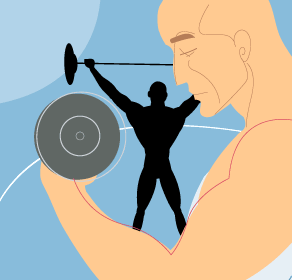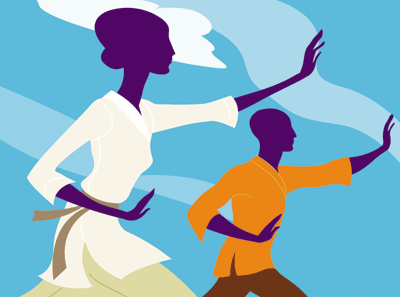Committing to Lifetime Fitness
“There are a million excuses for not working out,” sighed Rebecca Hyde ’92. Indeed. To those of us for whom the word “gym” connotes a belligerent man inseparable from his whistle, lap-running, and smelly, cotton uniforms with reversible shirts, just thinking about the health club might seem like an accomplishment. Sadly, we have no excuses left.

Roman Czula, professor of physical education and the mastermind behind Vassar’s lifetime fitness program, seeks to “eliminate the things in our daily lives that stop us from exercising.” Don’t fret — Vassar has not been transformed into a jock school. In fact, physical activity is not a new concept for the college. Jon Cruz ’05, author of the Miscellany News’ regular “Vassar Chronicles” column, wrote about Matthew Vassar’s own efforts to encourage physical activity: “First among these was the School of Physical Training, an assembly of instructors that offered classes that ranged from riding to gardening, swimming to boating, skating to club sports. The young women were expected to acquire ‘bodily strength and grace’ from such activities.” Main’s corridors were built to be “wide enough to accommodate rows of women taking brisk walks through the building’s long halls.”
For the on- (and near-) campus community, help is around the corner. Too intimidated by the new fitness center? A staff member can deliver a step-aerobics tape to your dorm room or office. Too tired to jog? Relax and re-energize with a free yoga class. Don’t know where to start? Make a complimentary appointment with a personal trainer. “My goal,” Czula said, “is for people to feel worse about missing their workout than they did about working out in the first place.” Every few weeks, Czula publishes In the Pink, an email newsletter and comprehensive guide to Vassar’s fitness offerings. Between 50 and 60 classes are held weekly at Walker Field House or at the new Athletic and Fitness Center, ranging from aqua fitness to non-contact boxing to swing dance. Most are free, but others cost $30 for a 10-week session. All members of the Vassar community, not just students, can and do take advantage of these opportunities.
The new thinking about lifetime fitness is holistic oriented, and considers mental health as important as resting heart rate. Some of Vassar’s latest programs emphasize general well-being, not just enhanced muscles. The popular “Mindfulness-Based Stress Relief” class reduces anxiety through meditation, and according to a recent New York Times article, “improves the robustness of the immune system.” Women may learn cutting-edge self-defense techniques through the renowned Rape Aggression Defense system (RAD), taught by Vassar Security officers.

The consensus is clear: it doesn’t matter what you do, as long as you do something. Scott Price ’76, orthopedic surgeon and team physician for the Chicago White Sox, put it bluntly: “There is some benefit to getting off your butt and going out and living life.” In today’s world, that might be easier said than done. Price continued, “All of the latest technological advancements we’ve had — like computers, cell phones, and PDAs [personal digital assistants] — are an attempt to free up time to allow people to do something. But our society is built on immediate gratification. There is not much opportunity for people to get fit, and it often takes an adverse event for people to change.” Some of Vassar’s newest facilities are intended to lure students and staff into physical activity. The new Athletic and Fitness Center, built in 2000, boasts a juice bar with smoothies and an architecturally spectacular lobby. To entice athletes and their seemingly elusive spectators to cheer on their favorite VC teams, the college’s sports initiative has just dedicated the J.L. Weinberg Field Sports Pavilion (named for the lead donors, Vassar Trustee Sue Gotshal Weinberg ’51 and John L. Weinberg) at Prentiss Field. This project has brought much-needed locker room space and sports medicine, changing, and storage rooms for Vassar and visiting teams as well as public restrooms for fans. Future phases of this project will include an NCAA-competition-level field for soccer, a lighted, artificial turf field for field hockey and lacrosse, a new baseball diamond, complete with dugouts, and a practice field for use by all of the field sports teams.
For most people, finding a tolerable exercise routine means finding their niche. The gym, a haven for some, might be excruciating for others. Hyde remarked, “I play soccer because I had a hard time getting excited about jogging.”

Popular culture screams that fitness can indirectly improve our social lives by trimming waistlines and sculpting abs, but according to the alums interviewed by the VQ, losing weight is the least of the benefits. Most echo Taft’s sentiment — they work out to hang out. Price reminisced about his days playing intramurals at Vassar, where “the guys on my team lived, ate, and partied together. It was like a family. We all want to have our in-group, and athletics allows you to find that.” Hyde remembered, “In college, soccer allowed me to keep my sanity. Most of the day I was studying in the library or involved in otherwise sedentary, intellectual activities. It was a huge stress relief.”

Pari Forood Novik ’80 recalled her days playing field hockey and tennis, when “as a freshman, I was introduced to senior girls I wouldn’t have met otherwise.” Twenty years later, Novik is trying to keep those fond memories alive and hoping to make new ones, as president of Athletics and Fitness Alumnae/i of Vassar College (AFAVC). The group, which formed in 2002, is intended to be a resource for fitness buffs (not to the exclusion of aspiring fitness buffs, of course). At college events like reunion, Commencement, and Founder’s Day, AFAVC is there to organize ad hoc games and workout sessions. For more information, visit www.aavc.vassar.edu and click on “Affiliate Groups.” Novik said, “We want people to have a network to stay connected to their teams.” Her advice for those without a team, or those who may have never been on one? “Exercise is the closest thing we have to a key to immortality. It improves everything from your heart to your outlook on life.”
The experts have spoken. If you don’t have a team, find one. Or a tai chi class, if that’s more your style.
